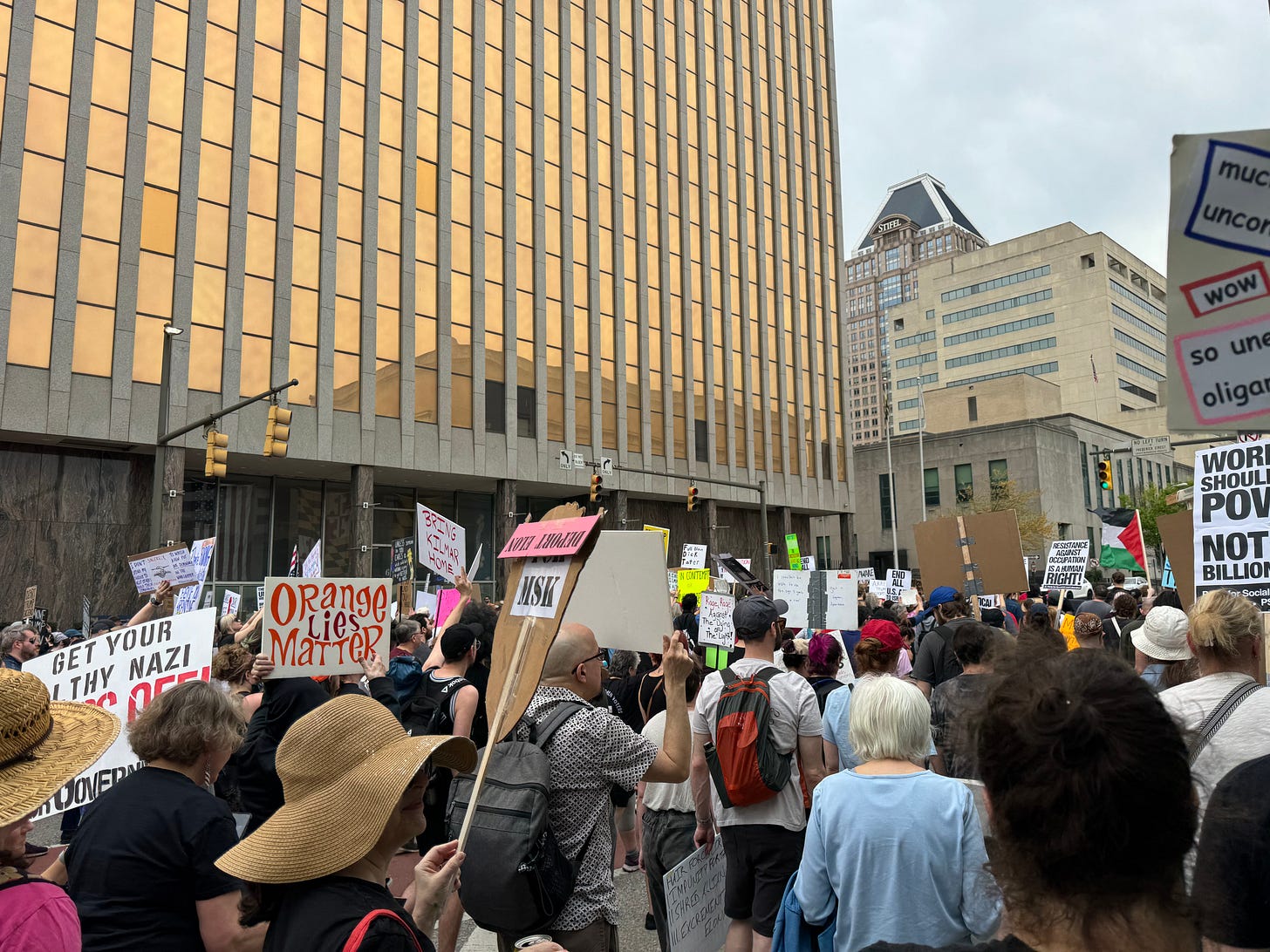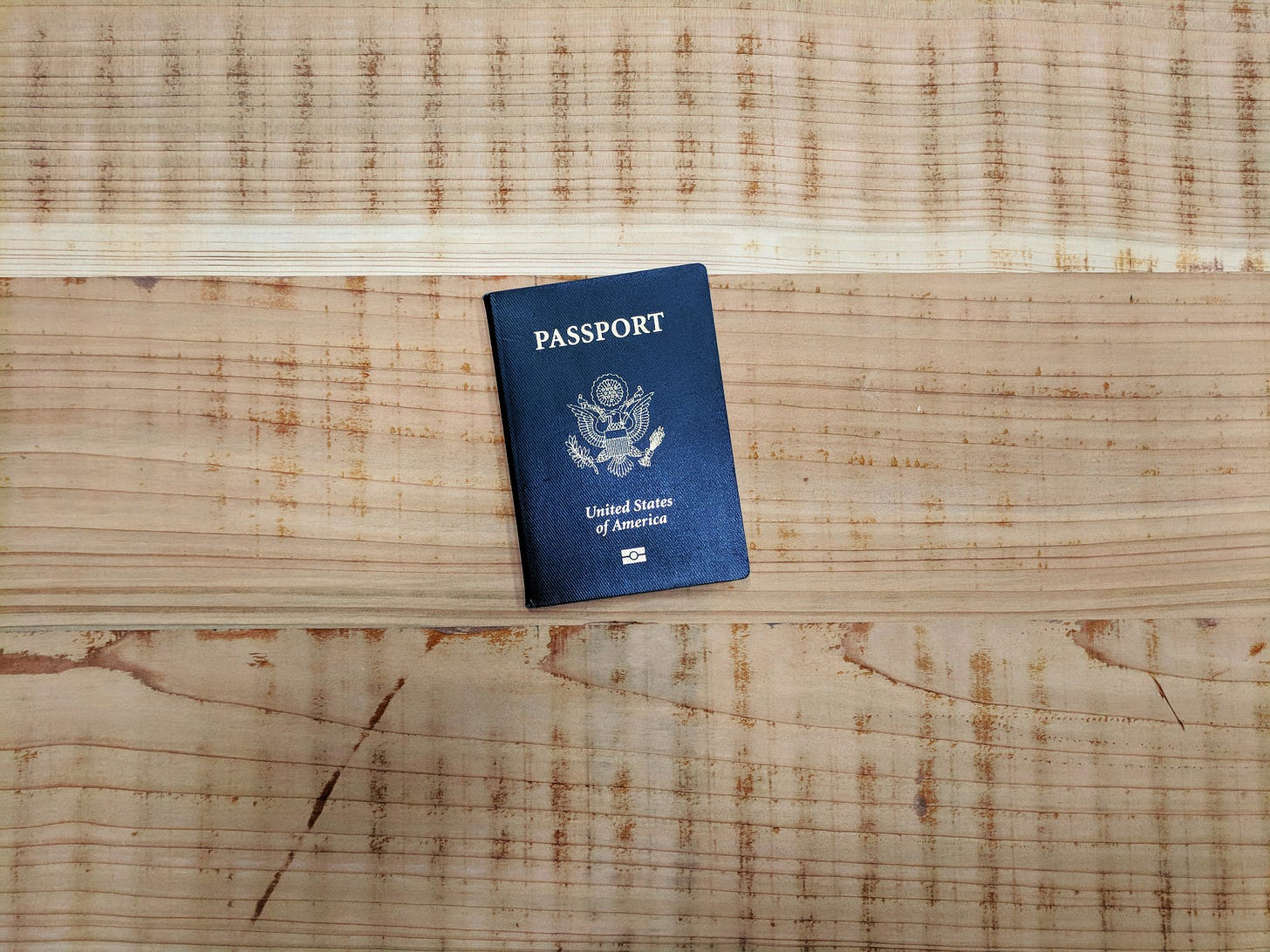Trump’s Thirteenth Week, Part 2: Federal Shake-Ups, Birthright Citizenship Challenge, and Rising Dissent
As courts weigh in and policies tighten, protests erupt nationwide while the administration presses forward with efforts to reshape federal power and immigration law.

Trump’s thirteenth week continued to bring sweeping developments in immigration, federal workforce policy, and a high-stakes legal battle at the Supreme Court. Mounting backlash over the wrongful deportation of Maryland resident Kilmar Armando Abrego Gracia intensified, with Sen. Chris Van Hollen successfully meeting with Abrego Gracia in El Salvador. As previously reported by The Introspective, Van Hollen had initially been denied access during an earlier visit aimed at securing Abrego Gracia’s return to the United States.
As anti-immigrant sentiment escalates, the Supreme Court has agreed to hear the Trump administration’s challenge to birthright citizenship—the constitutional right that grants citizenship to individuals born on U.S. soil. Oral arguments are scheduled for May, with a decision expected by late June or early July, raising major constitutional and political stakes.
In a separate ruling, the Supreme Court blocked the deportation of Venezuelan nationals detained in Texas under the 1798 Alien Enemies Act, which allows the president to arrest and deport noncitizens during times of war. As The Introspective previously reported, President Trump had attempted to invoke the centuries-old wartime law to send migrants to El Salvador’s Terrorism Confinement Center (CECOT), a facility facing international scrutiny for alleged human rights abuses.
Further fueling concern, the State Department on Friday announced that it would begin scanning the social media activity of visa applicants who have visited Palestine’s Gaza Strip since 2007. The policy applies to both immigrant and nonimmigrant visa categories, including students and tourists, and is being framed as a national security measure.
Meanwhile, Trump has intensified efforts to downsize the federal government. The administration reclassified 50,000 federal workers under the revived “Schedule F” designation—making it easier to dismiss civil servants by stripping them of long-standing job protections. The move follows an executive order reinstating the controversial program, which had been inactive since Trump’s first term.
Amid these sweeping policy changes, protests erupted across major U.S. cities on Saturday. Demonstrators voiced outrage over Abrego Gracia’s deportation, the U.S. government’s role in the ongoing bombardment of Gaza, mass federal layoffs, cuts to Veterans Affairs, and Trump’s broader anti-immigrant sentiment.
Abrego Gracia Fallout Continues
As controversy continues over the wrongful deportation of Kilmar Armando Abrego Gracia—a legal permanent resident of Maryland—to El Salvador, Sen. Chris Van Hollen was able to meet with Abrego Gracia on Thursday night. This follows a previous Introspective report that highlighted Van Hollen’s earlier attempt to visit him at the country’s Terrorism Confinement Center (CECOT), where he was denied access. The facility has faced widespread allegations of abuse.
“I said my main goal of this trip was to meet with Kilmar. Tonight, I had that chance. I have called his wife, Jennifer, to pass along his message of love. I look forward to providing a full update upon my return,” Van Hollen wrote in a post on X.
Following the meeting, President Trump criticized Van Hollen in a Truth Social post, calling him a “fool.”
“Senator Chris Van Hollen of Maryland looked like a fool yesterday standing in El Salvador begging for attention from the Fake News Media, or anyone. GRANDSTANDER!!!” Trump wrote.
A previous report by The Introspective detailed Abrego Gracia’s arrest by U.S. Immigration and Customs Enforcement (ICE) in Baltimore after picking up his son, who has special needs. While detained, he was denied a request to make a phone call, then transported to Texas before ultimately being flown to El Salvador. He had no criminal record and had been a legal U.S. resident since 2019.
“He said that he felt very sad to be in a place that’s meant for criminals,” Van Hollen told The New York Times.
“That’s not who he is.”
Van Hollen added that Abrego Gracia had since been transferred to a different detention center in Santa Ana, away from the controversial CECOT facility, but remained in isolation.
“He said that the conditions were better at this new detention center, but he was still in a total blackout,” Van Hollen said.
“No news from the outside world. Can’t speak to anybody at all.”
In an interview with NBC News on Sunday, Van Hollen accused President Trump of pushing the U.S. into a constitutional crisis. He noted that Abrego Gracia was deported without due process, in violation of the Fifth Amendment. He also reiterated that taxpayer funds were being used to send immigrants to El Salvador—a fact previously verified in a report by The Introspective.
“The Trump administration is going to pay the government of El Salvador ... to take these prisoners, including the illegally abducted Abrego Gracia,” Van Hollen said.
“I can tell you when they make that request to the Congress, and because those monies have to be appropriated, I don't think American taxpayers are going to want to spend one penny going to El Salvador to continue to hold somebody illegally and in violation of the United States Constitution.”
Immigration Surveillance, Restrictions, and Birthright Citizenship
Amid rising anti-immigrant sentiment following the deportation of Kilmar Armando Abrego Gracia, the Supreme Court announced Thursday that it will hear the Trump administration’s argument to repeal birthright citizenship — the constitutional right granting citizenship to anyone born in the United States. The case follows an executive order signed by President Trump at the beginning of his second term, which had previously been blocked by every lower court.
“All persons born or naturalized in the United States, and subject to the jurisdiction thereof, are citizens of the United States,” reads the 14th Amendment, which also granted citizenship to formerly enslaved Black Americans.
The court is scheduled to hear arguments on May 15, with a decision expected in June or early July.
Separately, the State Department announced that it will begin reviewing social media accounts of visa applicants who have visited the Gaza Strip since 2007 — dating back 18 years. The decision comes as more than 1,500 student visas have been revoked during Trump’s second term.
“If the review of social media results uncovers potential derogatory information relating to security issues, then a SAO must be submitted,” read a memo obtained by Reuters.
In the same report, a spokesperson for the State Department emphasized the administration’s strict vetting process.
“The Trump administration is focused on protecting our nation and our citizens by upholding the highest standards of national security and public safety through our visa process,” the spokesperson said.
“Security vetting runs from the time of each application, through adjudication of the visa, and afterward during the validity period of every issued visa, to ensure the individual remains eligible to travel to the United States.”
Meanwhile, the Supreme Court has temporarily blocked the deportation of Venezuelan immigrants under the Alien Enemies Act — a 1798 law that allows the president to arrest and deport noncitizens during times of war. A previous Introspective report highlighted President Trump’s attempt to invoke the 18th-century law to deport immigrants to El Salvador, with officials ignoring a previous court order halting those deportations.
Federal Workforce Realignment
As President Trump’s initiative to downsize the federal government continues, more than 50,000 federal employees have been reclassified under “Schedule F,” making it easier to fire or dismiss workers while reducing their civil service protections. The move follows a previous executive order that reinstated the program.
“If these government workers refuse to advance the policy interests of the president, or are engaging in corrupt behavior, they should no longer have a job,” Trump wrote on Truth Social.
“This is common sense, and will allow the federal government to finally be ‘run like a business.’ We must root out corruption and implement accountability in our federal workforce!”
Many officials reacted to the announcement, including Everett Kelly, president of the American Federation of Government Employees (AFGE), who warned that the action could hinder the government’s effectiveness.
“President Trump’s action to politicize the work of tens of thousands of career federal employees will erode the government’s merit-based hiring system and undermine the professional civil service that Americans rely on,” Kelly said in a press release.
“Politicizing the career civil service is a threat to our democracy and to the integrity of all the programs and services Americans rely on.”
Reviving Schedule F was outlined in Project 2025, a handbook written by the conservative Heritage Foundation and promoted by many Trump officials. The document details a plan to restructure the federal government, including the firing of existing federal employees and replacing them with individuals aligned with President Trump’s agenda.
Rising Protest and Dissent
Meanwhile, massive protests were held nationwide Saturday against the Trump administration, with demonstrators opposing actions taken during his second term—including anti-immigrant sentiment, mass government layoffs, the administration’s continued involvement in Palestine (including the ongoing bombardment of the Gaza Strip), violence by Israeli settlers against Palestinians in the West Bank, and cuts to government services such as Veterans Affairs.

“We are sending a clear and urgent message to the country and to those in power: The people are paying attention, we are organizing, and we will not accept authoritarian overreach, fascist policy, or the dismantling of our rights under the Constitution,” said Sarah Parker, a coordinator for the 50501 Movement, in an interview with CNN.
“The administration’s continued targeting of marginalized communities, the criminalization of dissent, and the erosion of civil liberties demand a response — and this is ours.”
The Introspective was on the scene at a massive protest in Baltimore, which was organized separately by members of the 50501 Movement and the Party for Socialism and Liberation (PSL). Demonstrators marched through downtown holding signs that read “Send Trump to prison in El Salvador!” and “Workers should have power, not the billionaires!”
The protests underscore growing animosity toward the Trump administration, as the president’s approval rating dropped to 43%, according to a poll conducted by Reuters—down from a high of 47% in January after he retook office.






